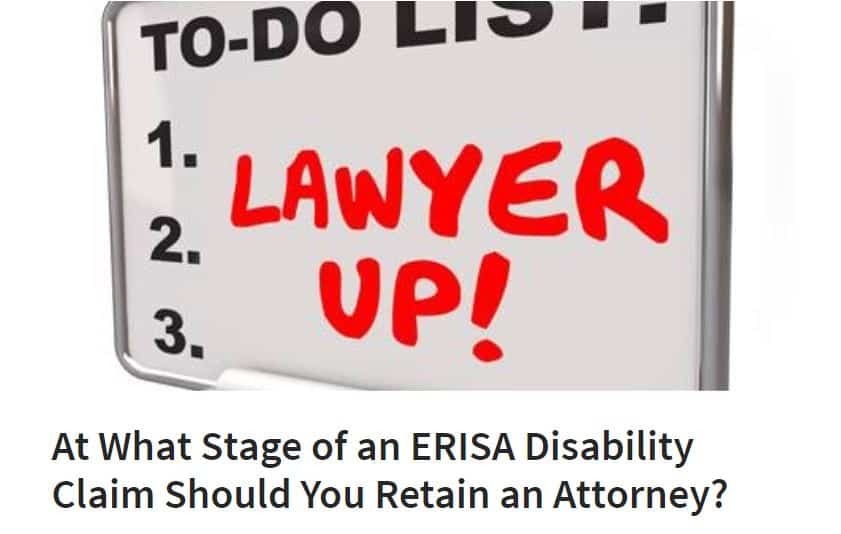Home » Benefits Insurance Claims » At What Stage of an ERISA Disability Claim Should You Retain an Attorney?

At What Stage of an ERISA Disability Claim Should You Retain an Attorney?
By Cassie Springer Ayeni; cassie@benefitslaw.com; www.benefitslaw.com
Today I met with a client who was in a pickle — she had already applied for disability benefits and was feeling nervous and pressured by an insurance company to provide additional information when she thought she had already submitted everything. Her question: should I hire you now or later? When it comes to ERISA disability claims, often the sooner you hire an attorney, the better.
Sure, most attorneys make more money if you’ve gone through the denial and appeal process on your own. After all, attorney fees skyrocket once you’re in litigation. Therefore they might encourage you to apply on your own then come back after you have a denied benefit to be appealed or litigated. But is this really in the client’s best interest? I think not. Indeed, I think attorneys have an ethical duty to try to obtain a favorable decision as soon as possible because that is in the client’s best interest.
But what advantage can an ERISA attorney provide when it’s just a submission of a claim application? An attorney worth her salt will not simply oversee form submission when it comes to applying for disability benefits. Rather, she will not only make sure that the forms are completed correctly, but she will anticipate future insurance company questions and submit supporting documentation before the insurance company asks for it. A complete claim submission packet can be almost as thick as an appeal of a denied benefit claim, containing medical evidence, analysis, sworn statements, and much more.
Although it is best to involve an attorney at the application stage, it does not occur to most people to do so until after a claim has been denied. This is OK too! However, for an attorney to do a great (not just good) job appealing a denial, that attorney must invest substantial time into obtaining all of the medical evidence necessary to prove your case and rebut the insurance company’s position. Why? Because if you have to sue the insurer in federal district court to obtain your disability benefit, under ERISA the judge is typically limited to reviewing only the medical evidence that appears in the claim and appeal record. In other words, there is no second chance to prove your case from a medical perspective once you file a lawsuit. Therefore, it is crucial that an attorney well-versed in ERISA does a great job with your appeal. A half-baked appeal or a submission of evidence without analysis will rarely get a favorable result.
The lesson is: when it comes to ERISA disability cases, the earlier you seek guidance from an ERISA attorney, the better. As for the potential client today? I gave her the same advice: 1) she could retain me to halt the application she submitted and to supplement with all of the additional documents I know she needs to succeed; or 2) she could roll the dice and see if she prevails (medically, she definitely should be entitled to benefits!). But with option 2, ultimately it takes more time and resources to reverse a denial than it takes to do it right the first time.





